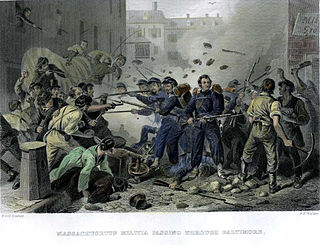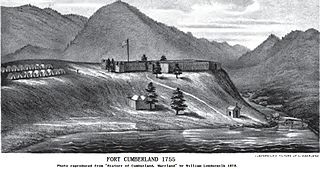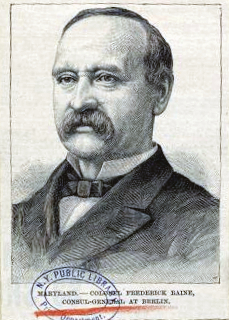
The Baltimore riot of 1861 was a civil conflict on Friday, April 19, 1861, on Pratt Street, Baltimore, Maryland. It occurred between antiwar "Copperhead" Democrats and other Confederate sympathizers on one side, and on the other, members of Massachusetts and Pennsylvania state militia regiments en route to the national capital at Washington who had been called up for federal service. The fighting began at the President Street Station, spreading throughout President Street and subsequently to Howard Street, where it ended at the Camden Street Station. The riot produced the first deaths of Union volunteers by hostile action, although caused by civilians, in the American Civil War. Civilians among the attackers also were killed.

George Howard was the 22nd Governor of the State of Maryland in the United States from 1831 to 1833. Howard was well known as a fervent anti-Jacksonian during his term in office.

David Stewart was an attorney and politician from Baltimore, Maryland. A Democrat, he was most notable for his service in the Maryland Senate and his brief service as an interim U.S. Senator from 1849 to 1850.
The Star Democrat is an American newspaper published and mainly distributed in Easton, Maryland, in Talbot County, as well as in the surrounding counties of Caroline, Dorchester, Queen Anne's and Kent. The Star Democrat is published on Wednesdays, Thursdays, Fridays and Sundays. The Tuesday edition is currently digital only.
The Capital is a daily newspaper published by Capital Gazette Communications in Annapolis, Maryland, to serve the city of Annapolis, much of Anne Arundel County, and neighboring Kent Island in Queen Anne's County. First published as the Evening Capital on May 12, 1884, the newspaper switched to mornings on March 9, 2015.
The Gazette, founded in 1727 as The Maryland Gazette, is one of the oldest newspapers in America. Its modern-day descendant, The Capital, was acquired by The Baltimore Sun Media Group in 2014. Previously, it was owned by the Capital Gazette Communications group, which published The Capital, Bowie Blade-News, Crofton-West County Gazette, and Capital Style Magazine.
Cumberland, Maryland, has several media outlets, most carrying some form of satellite programming. WCBC-AM and the Cumberland Times-News actively collect their local news content, while WFRB-FM has some local news content, but do not actively collect it.

Der Baltimore Wecker was a daily paper published in the German language in Baltimore, Maryland. It was the object of violence in the civil unrest at Baltimore in April 1861 that produced the first bloodshed of the American Civil War.
The Knoxville Register was an American newspaper published primarily in Knoxville, Tennessee, during the 19th century. Founded in 1816, the paper was East Tennessee's dominant newspaper until 1863, when its pro-secession editor, Jacob Austin Sperry (1823–1896), was forced to flee advancing Union forces at the height of the Civil War. Sperry continued to sporadically publish the Register in Atlanta, and later Bristol, until he was finally captured by Union forces in December 1864.

Virgil Maxcy was an American political figure. He was born in Massachusetts and spent his adult years in Maryland. He was killed in 1844 in a shipboard accident, when a cannon exploded aboard USS Princeton.

James Madison Buchanan was a Baltimore, Maryland jurist and diplomat.

Der Deutsche Correspondent was a German-language newspaper in Baltimore, Maryland. It was the most influential newspaper among Germans in Baltimore, lasting longer than any of the other German newspapers in Maryland.
The American Republican and Baltimore Daily Clipper was a newspaper published in Baltimore, Maryland in the mid-1800s. The paper supported slavery but opposed Confederate secession in the American Civil War, based on the premise that it would be possible to maintain slavery under the Union.

William Harrison Lowdermilk (1839–1897) was a Union soldier, printer, and newspaper publisher.

Frederick Raine was a German-American newspaper editor and later diplomat.

The Daily Exchange was a daily newspaper published in Baltimore, Maryland, United States from 1858 to 1861. It was originally owned and edited by Charles G. Kerr and Thomas Hall Jr. In 1859, Henry Fitzhugh, William Carpenter, and Frank Key Howard bought into the paper. Howard soon headed the editorial staff and Severn Teackle Wallis contributed editorial columns frequently.

The Baltimore Afro-American, commonly known as The Afro or Afro News, is a weekly African-American newspaper published in Baltimore, Maryland. It is the flagship newspaper of the AFRO-American chain and the longest-running African-American family-owned newspaper in the United States, established in 1892.
M. Virginia Rosenbaum (1921–2005) was Maryland's first female county surveyor and a member of the Maryland Society of Surveyors. For a short time she worked as a copy writer and eventually became the manager of WTBO radio station in Cumberland, Maryland. In 1961 Rosenbaum purchased a local Allegany County, Maryland, newspaper, The Allegany Citizen, renamed it to The Citizen, and edited and published the weekly paper for 28 years.

The 1903 Maryland gubernatorial election took place on November 3, 1903.












